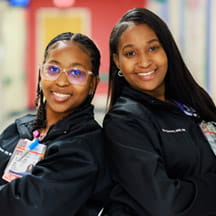A better understanding of each generation of employees can be an invaluable resource for employers and managers seeking to recruit and retain talent in the rapidly evolving workforce environment.
Most American workplaces are composed primarily of four distinct generational groups. Although generational experts may vary slightly on the age ranges they assign to each group, the underlying concept is that each generation shares a common history. The events and conditions they experience during their formative years determine how they see the world—those events shape their shared “generational personality.”
These personalities inform their motivations and expectations in the workplace. According to the Bureau of Labor Statistics, millennials make up the largest group of the health care workforce, followed by Generation X, Generation Z, and finally Baby Boomers.
Here’s an overview of each generation to better understand how to recruit, retain, manage and motivate staff of every age.
Baby Boomers (Born between 1946-1964)
Baby Boomers are fiercely competitive and take tremendous pride in their work. They’re motivated by recognition for their accomplishments and loyalty to their organization.
At more than 80 million strong, Baby Boomers have been renowned—until recently—as America’s most competitive generation. The post-war population explosion meant Baby Boomers needed to fight harder to compete for jobs and advancement within their careers. They are fiercely determined and take tremendous pride in their work.
Baby Boomers have had to make the biggest adjustments to technology in the workplace. And while some workplaces might already be feeling the crunch of this population heading off into retirement, a larger Baby Boomer exodus is on the horizon: according to 2022 Bureau of Labor Statistics data, nearly one in six nurses across all specialties—about 14%—hail from this generation.
What motivates Baby Boomers?
The combination of competitiveness and work-borne pride means recognition moves the needle for this generation. Embracing opportunities to acknowledge their fine work and loyalty to an organization is key.
Generation X (Born between 1965-1979)
Generation X grew up fending for themselves and thus are resourceful and independent. They crave flexibility and work-life balance from their career.
While their Baby Boomer parents were out working hard, Generation X—the “latchkey kids”—were often left to fend for themselves. This created a resourceful and independent mindset among this population that they carry into their adult lives and careers.
Generation Xers are more likely to be college educated than their parents, a reflection of not only the shifting American workplace but also the priority and pride Baby Boomers placed on obtaining quality higher education for their children.
They are not technology natives, but Generation X came of age as the digital revolution exploded and thus is very comfortable adapting to new technologies.
What motivates Generation Xers?
Work-life balance has always been a driving force for this group. Their upbringing of seeing their toiling parents making sacrifices for jobs that may not have paid off feeds their skepticism. Flexibility in the workplace is important to Generation X.
Millennials (Born between 1980-1994)
Millennials are commonly known as the most collaborative generation in history. They are the largest generational group in the nursing workforce and seek meaning from their work.
Millennials work well in team settings, and their thirst for collaborative efforts lends to a preference for flat organizations versus structured hierarchies.
For this generation, the impact of their work is paramount; beyond pay or advancement, millennials are driven to make a difference with meaningful work.
Millennials grew up with technology all around them and are very comfortable with new programs and processes.
What motivates millennials?
In nursing, millennials needn’t look far to find meaning in the work they do. But beyond the patients directly in their care, having opportunities to effect widespread improved outcomes through organizational changes—especially if done collaboratively—will resonate.
Generation Z (Born between 1995-2012)
Products of financial instability, Generation Zers are extremely competitive and driven primarily by money. They want flexibility in a career and opportunities to earn higher incomes with quality work.
Generation Zers are not only digital natives, but they expect to have access to the highest-quality technology in their workplace. Born into a world where they’ve been able to customize nearly every aspect of their lives, they crave the same type of flexibility in their careers.
They’ve experienced the Great Recession and other financial turbulence during their formative years, so they are also more driven by the compensatory aspect of work than the millennials who preceded them. And they’re poised to scrap for what they want—Generation Z has supplanted Baby Boomers as the most competitive of generational groups.
What motivates Gen Zers?
Money is the primary driver, but it’s not just the highest current offer that will attract Gen Zers. Raised in the “gig economy,” they understand there’s more than one way to attain their financial goals. Having the flexibility to customize job responsibilities and better position themselves for the next challenge can trump a bigger paycheck today.



